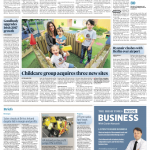Here is the second installment of our interview with John Kennedy where he reveals what his pet peeves are when it comes to news releases and how he decides which news goes to print and which goes online. Next week we ask John how do we get a journalist to attend a briefing or launch, how to prepare for your first interview and we will share some of his most memorable anecdotes of his career to date.
John is the editor of Ireland’s leading technology news website siliconrepublic.com as well as the weekly e-Thursday pages in the business section of the country’s biggest selling daily, the Irish Independent and the Digital Ireland monthly supplement. John also features occasionally on Dublin’s Newstalk 106 FM, where he discusses technology issues. His broadcasting experience also extends to discussing technology-related issues on the BBC World Service, RTE Drive Time and Today FM’s Sunday Business Show. In 2005 he was named Technology Journalist of the Year at the Irish Internet Association’s Net Visionary Awards.
What are your pet peeves when it comes to news releases?
Really, press release that are low on facts. Some journalists get a bee in their bonnet if the release is badly written. I think that’s absurd because it’s the journalist/editor who is responsible for their own ultimate product and its standard of writing. As long as the facts are there, there’s contact information, just leave the rest up to the journalist. Also, try and ensure that you’ve anticipated every possible question we might ask. Time is pressing, deadlines are unforgiving. Always get to know the journalist, their working habits and their deadlines. The amount of time people have pitched stories to me while I’m driving home, the paper has gone to press or as I’m reading the same story on a rival site or paper is frightening.
For me I hate receiving releases that are thinly disguised ads. If you want to sell a product, take an ad. Otherwise, make sure you have something to announce that is newsworthy.
When calling to follow up on press releases, how do you recommend the caller grabs your attention? What normally piques your interest?
If someone calls me up asking me if I got the press release, I feel like putting the phone down. Or I want to ask – ‘why? Did you get a bounce back?’ Ultimately it’s up to the editor what gets published. Don’t issue a release feeling entitled to it being covered. That’s our choice not yours. That’s where the pitch comes in. We want something newsy and special that readers would appreciate. Call well in advance, warning that something is about to happen. Otherwise, unless it’s a major development, it gets bundled in with everything else that may be dealt with if there’s time.
People also call me with unrealistic expectations. They haven’t gotten to know my deadlines and have often rung when the deadline has passed.
Lately I’ve been getting calls where someone is about to hit send on something. That’s fine if it is a big story. But if it becomes a regular tactic, it becomes annoying.
For building a relationship with you, is there anything companies can do aside from sending news releases and pitching features?
Shoot the breeze. Get to know me, my working methods, my deadlines and ultimately what the audience requires. The reality of online news as opposed to newspapers, although I do see this changing, is that the reader has joined the editorial board. We focus on analytics and know what stories are being read and what stories aren’t, for example.
Sending news releases and pitching features isn’t an original tactic, just an increasingly redundant part of an overarching strategy. The reason most people join the media is because they are interested in people and get a buzz from being around people. It is people at the end of the day that companies and their PR people are trying to reach. We’re watching all the time what people are reading and people are becoming more and more direct in their interaction with us. Journalists buzz off people, we learn from people. People make a good story. Add elements like Twitter into the mix and you’ve got to remember conversation is everything.
If you want to be part of this conversation, talk to me. Engaging with a journalist should not begin with ‘did you get the press release’.
How do you decide if news is suitable for both print and online coverage?
Online news sites can put out between five and 20 stories a day typically. Not everything is going to make it to print. That’s because there’s no room for everything. More often than not, however, the best interviews appear in print first because the idea was strong, it was exclusive and original enough for us to hold our fire.
Good interviews will always deserve a place in print. So if the story is backed up by direct contact, it will make it to print.
If you want to be part of this conversation, talk to me. Engaging with a journalist should not begin with ‘did you get the press release’ - John Kennedy





